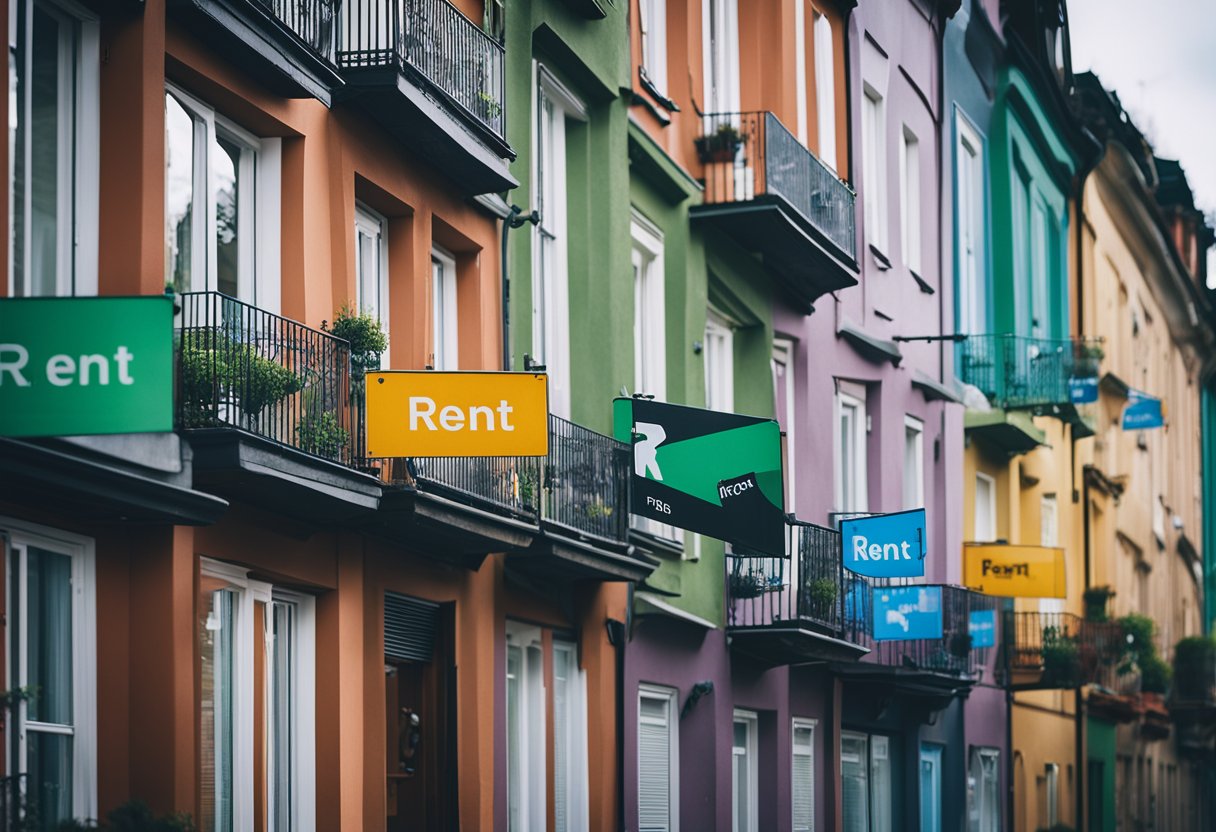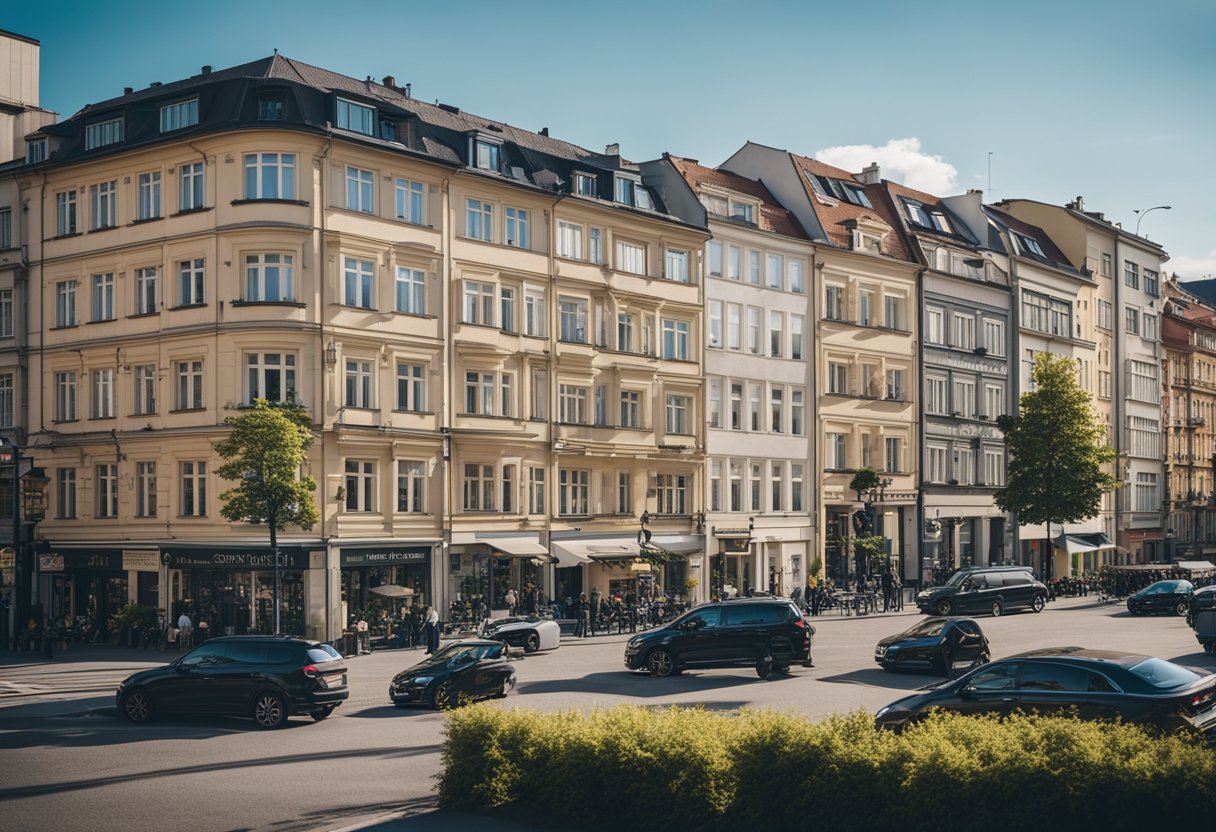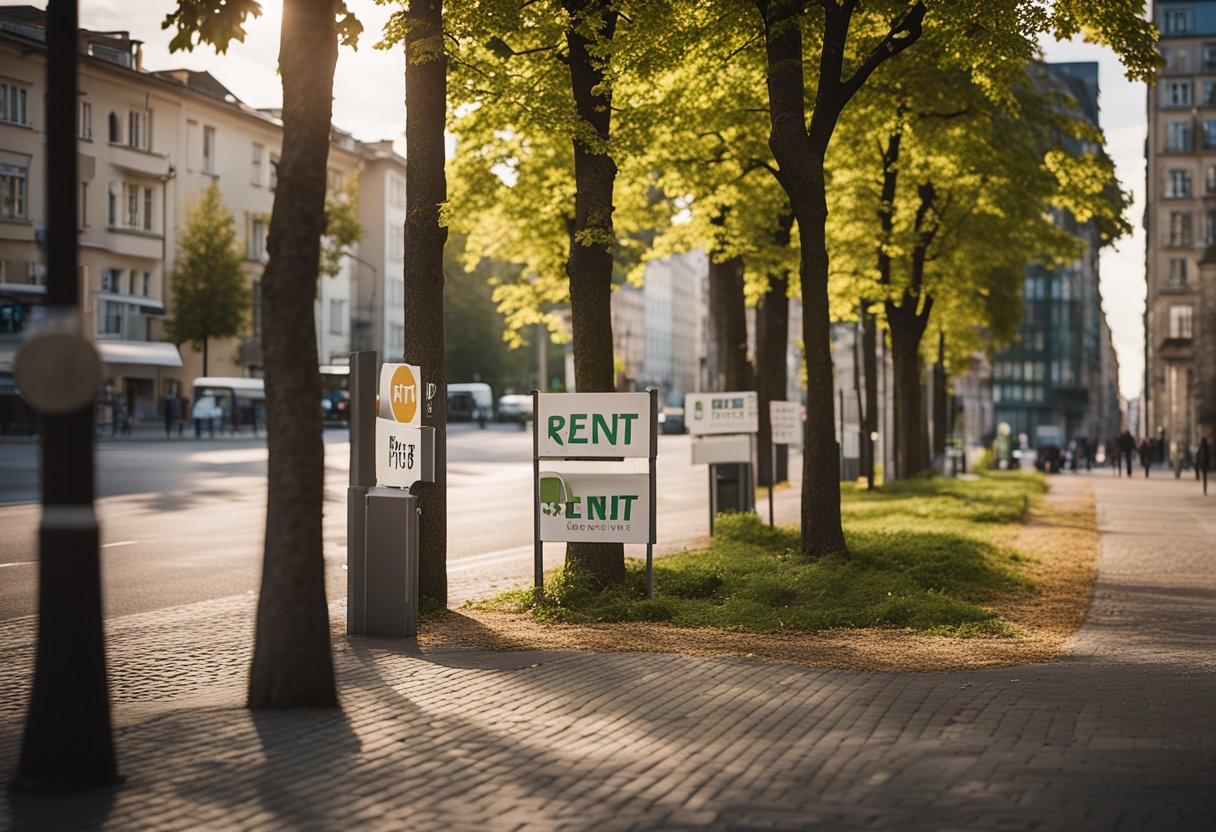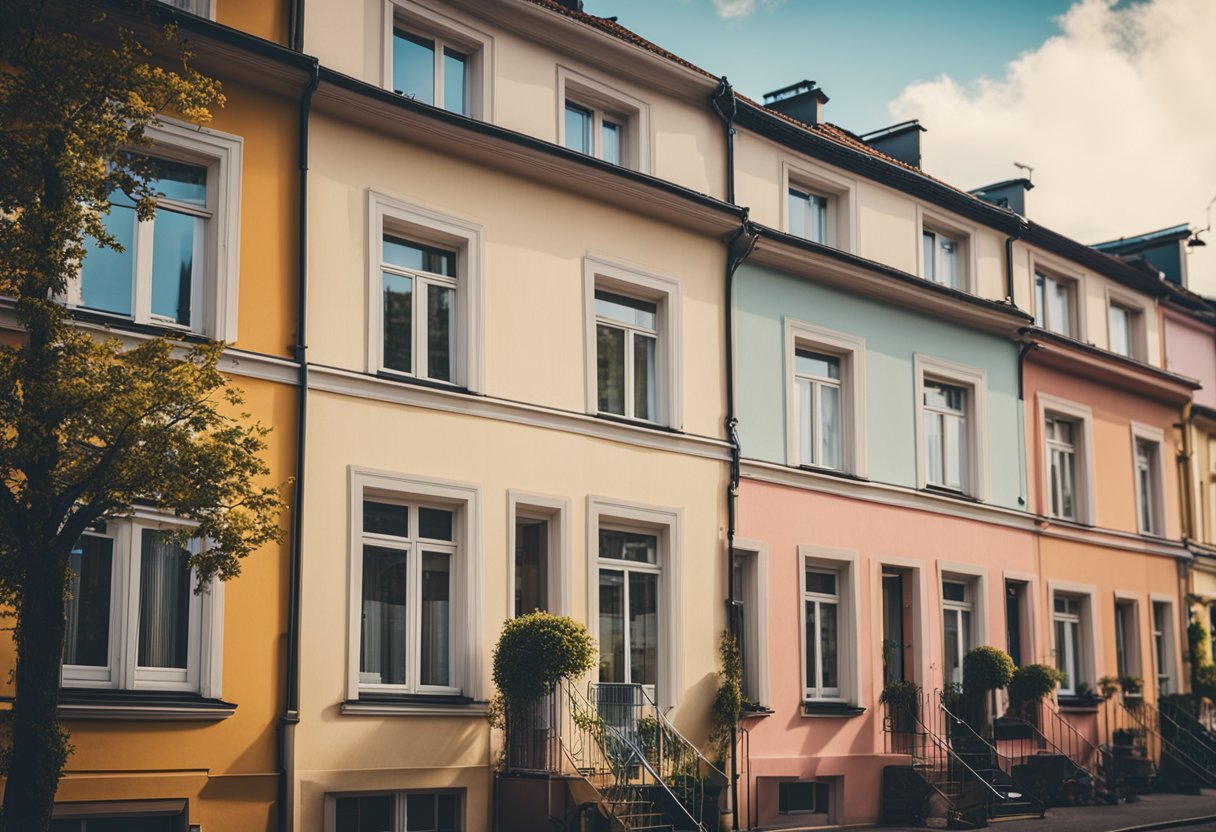Berlin, the capital of Germany, is a vibrant city that offers a unique blend of historical significance and modern-day culture, making it a popular destination for expats and locals alike.
The housing market in Berlin caters to a diverse range of preferences, featuring an array of homes for rent that offer the opportunity to experience life in this dynamic metropolis.
Renting a house in Berlin provides residents with the chance to immerse themselves in the city’s rich history, live in close proximity to a multitude of landmarks, and enjoy a variety of cultural and culinary delights.
Homes for rent are available throughout the city’s many boroughs, each with its own character and offerings. From the bustling streets of Mitte to the picturesque landscapes of Pankow, Berlin’s rental market is as diverse as the city itself.
Houses for rent in Berlin, Germany, can range from classic Altbaus with high ceilings and spacious rooms to modern apartments in newly developed buildings—each option presents a different way of living and appreciating the German capital.
It’s important for residents and newcomers to carefully consider their needs with regards to space, amenities, and location when selecting their Berlin home.
For expats moving to Berlin, the house-rental process can be straightforward with the right information at hand.
The city’s well-developed public transportation system ensures that living slightly off the beaten path is both practical and advantageous, as it provides an authentic local experience away from the usual tourist spots.
The choice to rent a house in Berlin is more than just a living arrangement; it’s a gateway to becoming part of a thriving, cosmopolitan community.
Understanding the Berlin Rental Market- Houses for Rent in Berlin
Navigating the Berlin rental market requires insight into the latest real estate tendencies, an understanding of the most sought-after neighborhoods, the legal context affecting housing, current pricing dynamics, and knowledge on where and how to find houses for rent.
Real Estate Overview in Berlin
Berlin’s real estate landscape is shaped by a mix of historical buildings and modern constructions, appealing to a diverse population of renters. Rental properties in Berlin range from spacious family homes to compact studio apartments, catering to different lifestyles and budgets.
Popular Areas for Renting
Areas such as Schöneberg and Hohen Neuendorf offer a blend of quiet, residential atmospheres with accessibility to city amenities. Neuenhagen bei Berlin and Schulzendorf are among the suburban locations that attract renters seeking tranquility outside the urban buzz.
The Impact of Berlin’s Housing Laws
Legislative measures, including the housing benefit and regulations such as the Mietendeckel, have been enacted with varied impacts on the city’s rental market. The overturning of the rent cap law has introduced fresh uncertainty into the market, with potential implications for all stakeholders.
Price Trends for Rentals
Rental prices in Berlin have been fluctuating, with an average rent of around €10.45 per square meter as of 2021, influenced by the legal framework and market demands. It is worth consulting with financial advisors or utilizing online platforms that keep rental listings current for the most up-to-date pricing information.
Finding Available Houses
Those looking for houses for rent in Berlin will find a range of options available and listed on various property portals and through real estate agents. Forethought regarding registration requirements and advance preparation is vital for a successful search in this competitive market.
The Rental Process
Finding the right home for rent in Berlin involves understanding the rental process – from searching for properties and comprehending rental agreements to adhering to legal requirements and evaluating financial considerations.
Searching for Properties
In Berlin, prospective renters can explore a variety of rental properties using online platforms that provide detailed listings.
Utilizing social media channels such as Facebook, LinkedIn, Twitter, and Instagram can also be beneficial, as many landlords and real estate agents share available listings and updates. Signing up for newsletters from real estate websites can keep potential tenants informed about new homes for rent in Berlin.
Understanding Rental Agreements
Rental agreements in Germany are legally binding contracts. They typically outline the rental period, the deposit amount, and the landlord’s and tenant’s obligations.
It is crucial to thoroughly review these documents to ensure understanding of the terms regarding the maintenance and condition of the property, as well as the notice period for terminating the lease.
Registration and Legal Requirements
Upon securing a house for rent, tenants in Berlin must register their new address at the local registration office and receive a registration certificate.
Renters from abroad should ensure they have a valid residence permit. Additional documentation such as a tax ID and social security ID may be necessary for the registration process.
Financial Considerations
Financial aspects of renting houses in Berlin include the security deposit and the rental costs. For international renters, money transfers and banking in Germany involve setting up a local bank account or using a blocked account (Sperrkonto). Learning how to open a bank account in Germany can streamline rent payments and other financial transactions.
Moving and Relocation Services
For those moving from afar, relocation services in Berlin can assist with finding housing, moving belongings, and addressing settlement needs. They provide support in navigating the housing market, understanding local regulations, and connecting clients with essential services for a smooth transition.
Living in Berlin
Berlin, with its rich history and vibrant culture, offers a unique living experience. The city is known for its excellent public transport system, robust healthcare, quality education institutions, diverse job market, and streamlined banking and tax procedures.
Transportation and Connectivity
Berlin boasts an extensive and efficient public transportation network, including buses, trams, U-Bahn (subway), S-Bahn (suburban trains), and regional trains connecting to Brandenburg and other areas.
Major hubs like Ostbahnhof ensure easy connectivity within the city and beyond. Commuters in the suburbs, such as Hoppegarten, also enjoy regular services.
Healthcare and Insurance
Residents in Berlin are covered by the German healthcare system, which is one of the world’s oldest. It provides access to a wide network of doctors, hospitals, and dental care services.
Health insurance is mandatory, with options for statutory health insurance or private health insurance, including specific student health insurance plans.
Education and Schools
Educational opportunities in Berlin are abundant, from kindergartens to universities. The city offers a range of options for daycare and childcare (Kita), language certification, and integration courses. Schools follow a high standard, with several international schools available for expatriates.
Banking and Taxes
Banking in Germany is straightforward, with numerous banks offering services for locals and expatriates. The German tax system can be navigated with the help of the annual tax form (ELSTER), which must be submitted by residents to declare their income and calculate taxation responsibilities.
Working in Berlin
Berlin’s job market is diverse and dynamic, providing ample opportunities to find a job or progress one’s career. The city is a hub for startups, technology, and creative industries, with various resources available to help job seekers secure jobs in Berlin.
Integration into German Society
When expatriates move to Berlin, they often seek residences that allow them to immerse into local society. The process of integrating into German society involves understanding and adhering to several key legal and cultural steps, which ensures a smoother transition for expats looking for homes.
Visa and Residency
For expats to rent homes in Germany, they first need the proper visa and residence permit. The type of visa required depends on the person’s nationality and the purpose of stay.
Upon arrival in Berlin, one must register at the local Residents’ Registration Office (Bürgeramt) and obtain a registration certificate. A residence permit for longer stays can be applied for at the Foreigner’s Registration Office (Ausländerbehörde).
Learning the German Language
Mastery of the language is a cornerstone of integration. Expatriates are encouraged to enroll in an integration course, which includes German language lessons and information about the country’s legal system, history, and culture.
Successful completion requires passing a language certification exam, demonstrating proficiency in German to at least a B1 level according to the Common European Framework of Reference for Languages.
Understanding German Culture
To effectively integrate into German society, it is vital for expats to acquaint themselves with local customs and holidays. Berlin boasts a diverse cultural scene and observing German holidays and traditions is part of community life. Participation in cultural events and local festivities aids in understanding the social fabric of the city.
The Path to Naturalisation
Long-term expats in Berlin may consider obtaining German citizenship. This process usually requires eight years of residence, sufficient German language skills, a clean criminal record, and passing the naturalisation test. Upon successful naturalisation, individuals are granted all the rights of a citizen, including a German passport.
Family and Social Benefits
In Berlin, Germany, families have access to a comprehensive social security system that offers a variety of benefits, including support for children and financial assistance through various social programs.
Child and Family Benefits
Residents in Berlin who are starting or raising a family can benefit from child benefits (Kindergeld), which are payments provided by the state to support the cost of raising children.
Eligible families receive a monthly payment for each child, which can significantly help with living expenses. The process of registering a birth is an essential step for families, as it is required to obtain a birth certificate, which is needed to apply for child benefits.
Another critical support is the parental allowance (Elterngeld), designed to support parents financially during the time off work following the birth of their child. Furthermore, maternity benefits (Mutterschaftsgeld) are available to expectant mothers, providing financial aid during maternity leave.
For those dealing with family health matters, child sickness benefit (Kinderkrankengeld) is also available to support parents who need to take time off work to care for a sick child.
Social Security and Support
Germany’s robust social security system encompasses numerous benefits, including unemployment benefit, sickness benefit, and long-term care insurance. Unemployment benefit (Arbeitslosengeld) offers financial support to those who have lost their jobs and are currently seeking employment.
Sickness benefit ensures that individuals who are unable to work due to illness receive compensation.
Lastly, long-term care insurance provides necessary support for individuals requiring long-term care, whether due to aging or disability. This insurance aims to alleviate the financial burden of sustained care needs for individuals and their families.
Finding homes for rent in Berlin can be made easier by understanding the various social benefits available, ensuring families and individuals have the necessary support in place.
Mobility in Berlin
When seeking houses for rent in Berlin, Germany, understanding the city’s mobility options is essential. Berlin offers a varied array of transport services, and navigating the legal landscape is imperative for residents who drive.
Public and Private Transport Options
Berlin boasts an extensive public transportation system which includes the U-Bahn (subway), S-Bahn (suburban trains), buses, and trams. These services run with a high frequency and cover the entire city, making them convenient for residents.
Additionally, car sharing and bike sharing programs are widely available for those who prefer more flexibility. For private transport, individuals often consider buying a car or car leasing options, each requiring compulsory car insurance.
- Public Transport: U-Bahn, S-Bahn, buses, trams.
- Private Transport: Car sharing, bike sharing, personal vehicles.
Legal Requirements for Drivers
Anyone who wishes to drive in Berlin must have a valid driving licence. If coming from outside the EU, individuals may need an International Driving Permit alongside their national license.
Registering a vehicle in Berlin requires visiting the KFZ-Zulassungsstelle (vehicle registration office) and providing proof of technical inspection (TÜV), which ensures that vehicles meet safety standards.
- Driver’s Licence: EU or International Permit required.
- Vehicle Registration: Proof of TÜV and insurance needed.
Understanding Traffic Regulations
Navigating Berlin’s roads means adhering strictly to traffic regulations. The city has an array of road signs, and it’s important to comprehend their meanings.
Speed limits are strictly enforced, especially in urban areas, and differ when driving on the Autobahn, where certain stretches have no speed limit. Traffic fines can be hefty, so it’s essential for drivers to stay informed of the latest traffic laws.
- Speed Limits: Vary by area, unlimited in some Autobahn sections.
- Road Signs: Key to understanding traffic rules, fines for non-compliance.
Communication and Connectivity
When securing a house for rent in Berlin, Germany, one must ensure they have access to robust mobile and internet services, know how to navigate emergency services, and understand the essentials of integrating into local social networks for a smooth transition.
Mobile and Internet Services
In Berlin, tenants can choose from a variety of mobile telephony providers, offering competitive plans for both local and international communication.
Access to high-speed internet is critical, and most houses for rent in Berlin provide the necessary infrastructure to establish a phone line and WiFi connection. Among the popular service providers are Deutsche Telekom, Vodafone, and O2, each offering a range of packages tailored to different needs.
- Providers: Deutsche Telekom, Vodafone, O2
- Plans Available: Individual, Family, Unlimited Data
Navigating Emergency Services
Understanding how to contact emergency services is crucial. In Berlin, the primary emergency number is 112, which connects callers to fire services and medical assistance. For police services, one should dial 110. It’s imperative for residents to have these emergency numbers easily accessible.
- Fire & Medical: 112
- Police: 110
Integrating into the Social Networks
Integration into Berlin’s social fabric can be facilitated through digital platforms such as Facebook, LinkedIn, Twitter, and Instagram.
These networks provide avenues for connecting with local communities, staying informed about neighborhood events, and networking professionally. They serve as vital tools for newcomers to acclimate to the city’s culture and develop personal and professional relationships.
- Professional Networking: LinkedIn
- Community Events: Facebook, Instagram
- News and Updates: Twitter
Settling in Berlin
Berlin offers a vibrant mix of modern living spaces and rich cultural experiences, making it an attractive place for many looking to settle in the German capital. From an ample selection of homes to diverse leisure opportunities, the city caters to various lifestyles and preferences.
Housing and Accommodation
Berlin’s housing market provides an extensive range of options for those seeking to make this city their home. Houses for rent in Berlin vary from traditional family homes in leafy suburbs to modern apartments in bustling city districts.
Currently, there are a multitude of available houses for rent in Berlin, with furnishing levels ranging from bare to fully equipped, catering to both short-term and long-term stays.
For more urban living, apartments for rent in Berlin offer convenience and accessibility to the city’s amenities. Sites like HomeToGo and Rentberry give potential renters a platform to find their ideal accommodation.
Cultural and Recreational Activities
Beyond accommodation, Berlin is a hub for culture and relaxation, boasting numerous activities to immerse oneself in the local lifestyle.
The city is home to world-renowned museums, historical sites, and a vibrant arts scene. For recreation, one can find a plethora of green spaces and parks, aside from the energetic nightlife and dining scenes.
Berlin’s calendar is dotted with German holidays and festivals, offering residents a chance to join in on local traditions and celebrations. For families and individuals alike, cultural enrichment and recreational enjoyment are never too far from one’s doorstep in Berlin.
Expatriate Resources
Expatriates relocating to Berlin will benefit greatly from local resources designed to ease their transition. They can seek assistance through various community networks, overcome typical expatriate challenges, and find professional services tailored to their needs.
Expat Communities and Networks
Expatriate communities provide an essential support network for those moving to Berlin. Websites like IamExpat Housing offer listings for houses for rent in Berlin, Germany and function as a central hub for expat info and interaction.
Moreover, Facebook groups and other social platforms are invaluable for connecting with fellow expats who have firsthand experience navigating life in Berlin.
Overcoming Expat Challenges
Newcomers often face hurdles such as cultural adjustments and language barriers. To mitigate these challenges, they should seek out local expat events and groups that facilitate cultural exchange.
In addition, many online resources offer guidance on common issues, from securing homes for rent in Berlin, Germany, to understanding local customs and regulations.
Finding Professional Services
For financial and legal matters, expatriates will find a selection of financial advisors equipped to handle international considerations. Furthermore, relocation services specialize in helping expats settle in, providing comprehensive packages that include assistance with finding houses for rent in Berlin, Germany.
These professionals are adept at ensuring a smooth transition and can advise on various aspects of Berlin life, from accommodation to fiscal matters.
Neighboring Regions
Seeking homes for rent in Berlin, Germany, offers prospective residents the unique advantage of proximity to both scenic regions such as Brandenburg and access to international commuting options from bordering countries like the Netherlands and Switzerland.
Exploring Brandenburg and Surroundings
Brandenburg, the region that encircles Berlin, is known for its natural landscapes and tranquil settings, providing a stark contrast to the bustling city. Houses for rent in Berlin, Germany, benefit from the close vicinity to this green belt, making it possible for renters to enjoy both urban living and countryside serenity.
Brandenburg is replete with lakes and forests, which are ideal for weekend getaways or leisurely day trips.
Commuting from Bordering Countries
Berlin’s position in Central Europe makes it feasible for individuals to commute from bordering countries. The Netherlands and Switzerland, while not immediate neighbors, have efficient train connections that can transport you to the heart of Berlin.
This opens up possibilities for those who work in Berlin but prefer the experience of residing in a different European country. It is not uncommon for commuters to consider houses for rent in Berlin, Germany, as a secondary residence during the working week or for periodic stays in the city.
Frequently Asked Questions
When looking for houses to rent in Berlin, Germany, potential renters are often met with a range of questions regarding the process, costs, and options available. This section aims to address some of the most common inquiries.
What websites are recommended for finding rental properties in Berlin?
Individuals searching for rental properties in Berlin often use trusted online websites such as WG-Gesucht.de for rooms and platforms like Immobilienscout24.de, Immonet, and Immowelt for apartments.
How does the cost of renting a 2-bedroom house in Berlin compare to a 3-bedroom one?
Due to higher demand and limited availability, the cost of renting a 2-bedroom house in Berlin is typically more affordable than a 3-bedroom house. The price difference depends on location, size, and amenities provided.
What is the typical monthly rent for a house in Berlin?
The typical monthly rent for a house in Berlin varies widely based on location, size, and condition of the property. A 70 m2 house in Treptow-Köpenick may rent for around 2,800 EUR per month.
What are the options for students seeking affordable apartments in Berlin?
Students looking for affordable housing in Berlin can explore dormitories, shared flats, or renting individual rooms. Websites like WG-Gesucht.de often list offers suitable for students’ budgets.
Can non-residents rent properties in Berlin, and what are the requirements?
Yes, non-residents can rent properties in Berlin. The main requirements include proof of income or savings, a Schufa credit report for long-term rentals, and sometimes a guarantor if the renter does not meet the income criteria.
How does the cost of living in Berlin affect the overall affordability of renting?
The cost of living in Berlin impacts affordability, as apartment rental prices are a major expense for residents. One’s lifestyle and spending habits will dictate how living costs influence the overall affordability of renting in the city.





